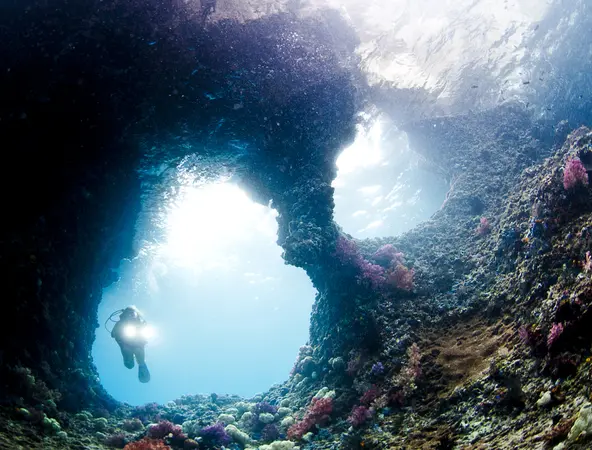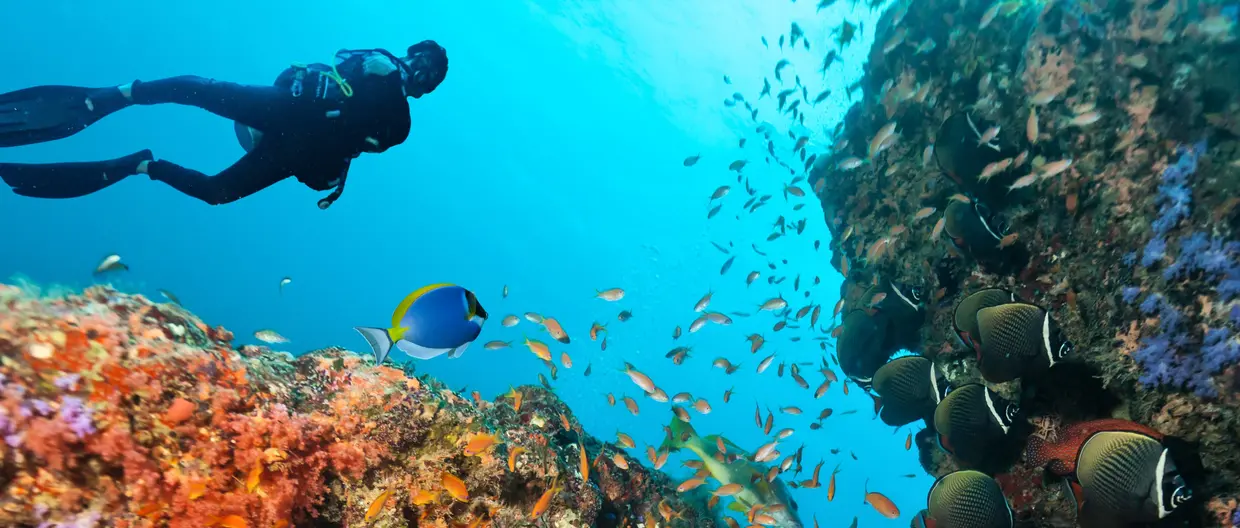Key Takeaways:
- Despite the significant value that oceans contribute to the global economy and society, the financial risks of ocean degradation are often overlooked.
- Investments in SDG 147 remain limited. Out of the 67 companies engaged on material ocean risks by Amundi, less than half had some sort of acknowledgement of their links to oceans.
- Investment in ocean-related initiatives is slow but there are numerous opportunities arising.
- Amundi’s approach aims to minimise ocean-related risks in portfolios, by reducing negative impacts and investing in companies that are leaders in addressing ocean issues.
How can something so big be so forgotten?
The ocean covers 71% of the Earth’s surface1 and are essential to our livelihood and economy
Despite its importance, oceans are often on the back burner of ESG materiality and management. Human activities, that cause pollution and exploitation, are driving a decline in ocean health, costing an estimated $4 billion annually, which could rise to $2 trillion by 21008.
Solutions to mitigate oceans risks
The international initiative to protect and restore ocean health, often referred to as Sustainable Development Goal 14 (SDG 14), needs to be intensified to address the growing threats of climate change, pollution, and unsustainable resource extraction. SDG 14 “Life Below Water” is shown to be the least funded9 SDG with only $10 billion invested between 2015 and 2019, far below the expected $175 billion annually10. Based on this trajectory, the goal of conserving 30% of coastal and marine areas by 2030 will not be met until 210711.

Most companies underestimate the importance of having clear plans to handle their impact on oceans, focusing instead on more immediate material concerns. Amundi engaged with 67 companies on ocean protection in 2024, 20 of which were identified as Ocean100 Companies. Across all 67 companies evaluated, over half demonstrated some level of acknowledgement of their link to ocean impacts and over 80% already have actions in place to address key ocean impacts such as pollution.
Investing in the ocean
Investment in ocean-related initiatives is slow, with blue bonds* making up only 0.2% of sustainable bond issuance since 201912. At Amundi, we consider that investing in opportunities that can help protecting the oceans are important because:
- A decline in ocean health will have a negative impact on the economy
- All corporates have an impact on oceans through their products or processes and must mitigate their risks
- Oceans are key in fighting climate change as they serve as a carbon sink. Ocean-based climate solutions could reduce the emissions gap by up to 35% in the 1.5°C pathway
As a result Amundi have developed a dedicated approach to better consider oceans into investment solutions and decisions.
Amundi’s Actions
Amundi’s approach aims to minimise ocean-related risks in portfolios by reducing negative impacts and investing in companies that are leaders in addressing ocean issues. The bespoke biodiversity investment framework developed follows a three-step approach:
Avoid

Avoid
Companies can be excluded from all actively managed funds if they are found to be in violation of the UN Global Compact13, particularly regarding the three environmental goals14 that address ocean impacts. Furthermore, Amundi’s ESG analysts conduct a thorough controversies review multiple times a year to analyse their severity and validity.
Reduce

Reduce
Amundi’s ESG analysts conduct assessments of companies’ most material topics to evaluate their ESG ratings and encourage them to better consider issues that could impact their financial valuation. Amundi have increased the number of engagements from 9 companies in 2019 to 67 in 2024.
Favour

Favour
The favour pillar aims to direct financial flows towards ocean protection by investing in leaders on biodiversity- related matters, including green bond and blue bond issuers. Amundi also advises companies on issuing blue bonds to ensure impact reporting and alignment with principles like International Capital Market Associations (ICMA)15.
In 2023, Amundi engaged with a European energy company that issued a blue bond for marine ecosystem restoration and sustainable shipping, encouraging them to adhere to ICMA’s15 Green Bond Principles and develop a blue bond framework to provide investors with clear information on the projects to be financed.
Unlocking potential investment opportunities for ocean preservation
Oceans play a crucial role in maintaining the stability of the Earth's ecosystem, yet the current efforts to manage these risks are far from sufficient. Their unique nature adds an extra layer of complexity to managing ocean-related risks. The challenges of measuring and managing land-based environmental impacts are already complex, making ocean protection seem like an even more distant goal.
However, reporting standards and processes for managing ocean impacts already exist, and there are actions that can be taken now. These include incorporating ocean elements into nature strategies and Responsible Investment policies, as well as through engagement.
The development of financial instruments, such as blue bonds, along with guidelines for their use, will be key drivers of blue economy financing. This may offer investors numerous potential opportunities to finance ocean preservation.
Explore how investment policies and new financial tools together support ocean preservation
*Blue bonds: A debt instrument that national governments, development banks and corporations issue to raise finance for marine and ocean-based projects that have long-term sustainability objectives and benefits.
1 https://education.nationalgeographic.org/resource/ocean/
3 https://initiatives.weforum.org/ocean-action-agenda/home https://initiatives.weforum.org/ocean-action-agenda/home
4 https://www.oceano.org/en/resources/1-a-healthy-ocean-for-a-healthy-die… https://initiatives.weforum.org/ocean-action-agenda/home
5 https://www.un.org/en/climatechange/science/climate-issues/ocean-impacts
6 https://www.fondationdelamer.org/wp-content/uploads/2023/12/Referentiel…
7 https://oceanpanel.org/the-oceans-importance/ https://impact-investor.com/un-ocean-conference-sdg-14-still-most-underfunded/
8 https://oceanpanel.org/the-oceans-importance/
9 https://impact-investor.com/un-ocean-conference-sdg-14-still-most-underfunded/
10 https://www.un.org/en/desa/world-oceans-day-call-action-save-our-ocean
12 https://www.spglobal.com/_assets/documents/ratings/research/101593071.pdf
13 See our Global Responsible Investment Policy for more details: https://www.amundi.com/institutional/responsible-investment-policies-reports
14 Principle 7: Businesses should support a precautionary approach to environmental challenges; Principle 8: undertake initiatives to promote greater environmental responsibility; and Principle 9: encourage the development and diffusion of environmentally friendly technologies.
Unless otherwise stated, all information contained in this document is from Amundi Asset Management S.A.S. and is as of 9 June 2025. Diversification does not guarantee a profit or protect against a loss. The views expressed regarding market and economic trends are those of the author and not necessarily Amundi Asset Management S.A.S. and are subject to change at any time based on market and other conditions, and there can be no assurance that countries, markets or sectors will perform as expected. These views should not be relied upon as investment advice, a security recommendation, or as an indication of trading for any Amundi product. This material does not constitute an offer or solicitation to buy or sell any security, fund units or services. Investment involves risks, including market, political, liquidity and currency risks. Past performance is not a guarantee or indicative of future results.
Date of first use: 9 June 2025
Doc ID: 4550409
Marketing Communication – For Professional Clients only
